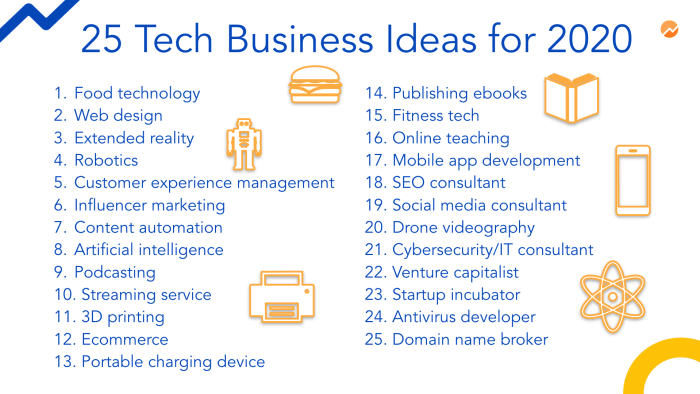Online Business Ideas: Embark on a journey through the ever-evolving landscape of digital entrepreneurship, where innovation meets opportunity and success awaits those daring enough to venture into the realm of online business.
From e-commerce to subscription services, discover the secrets to unlocking the potential of various online business models and learn how to carve your niche in the vast online marketplace.
Introduction to Online Business Ideas

Online business ideas refer to innovative concepts or opportunities that can be pursued on the internet to generate income. In today’s digital age, exploring various online business opportunities is crucial for individuals looking to start their own ventures or expand their existing businesses. The evolution of online business ideas over the years has been significant, with advancements in technology and changes in consumer behavior shaping the landscape. Starting an online business offers numerous benefits compared to traditional brick-and-mortar establishments, including lower overhead costs, wider reach, and flexibility.
Popular Online Business Models
When it comes to online business models, there are several popular options that entrepreneurs can explore. Each model has its unique features, working mechanisms, and levels of profitability and scalability. Let’s take a closer look at some of the most common online business models:
E-commerce
E-commerce involves selling products or services online through a website or online marketplace. Businesses can either create their own e-commerce website or use platforms like Shopify, Amazon, or Etsy to reach customers. This model allows for direct sales to consumers without the need for a physical store. Successful examples include Amazon, eBay, and Etsy.
Subscription Services
Subscription services offer customers access to products or content on a recurring basis in exchange for a subscription fee. This model provides a predictable revenue stream and fosters customer loyalty. Examples include Netflix, Spotify, and Dollar Shave Club. The key is to continuously provide value to subscribers to retain them.
Affiliate Marketing
Affiliate marketing involves promoting other companies’ products or services and earning a commission for each sale or lead generated through your referral. This model is low-risk for the affiliate as they don’t have to create or stock products. Successful affiliate marketing businesses include Amazon Associates, ClickBank, and ShareASale.
Comparison and Contrast
E-commerce businesses focus on selling products directly to consumers, while subscription services offer recurring access to products or content. Affiliate marketing relies on promoting other companies’ products for a commission. E-commerce can be highly profitable but requires significant investment in inventory and marketing. Subscription services offer recurring revenue but need continuous value delivery. Affiliate marketing is low-risk but requires building a strong audience for conversions.
Identifying Niche Markets for Online Business
In the world of online business, identifying niche markets is crucial for success. Niche markets are specific segments of the market that have unique needs or preferences, often overlooked by larger businesses. By targeting these niche audiences, online businesses can stand out and attract loyal customers.
Explaining Niche Markets
Niche markets in online business refer to specialized segments of the market with distinct characteristics and needs. These markets are often underserved by mainstream businesses, creating opportunities for entrepreneurs to cater to specific interests or preferences.
- One strategy for identifying profitable niche markets is to conduct market research to understand consumer behavior and identify gaps in the market.
- Another approach is to look for underserved or overlooked segments within broader markets and tailor products or services to meet their unique needs.
- Utilizing research and analyzing trends can also help in identifying niche markets with high demand and low competition.
Importance of Targeting Niche Audiences
Targeting niche audiences is essential for online business success as it allows businesses to differentiate themselves from competitors and build a loyal customer base.
- By focusing on a specific niche, businesses can develop specialized expertise and create tailored solutions that meet the unique needs of their target audience.
- Niche marketing also helps in building brand loyalty and establishing a strong online presence, leading to higher conversion rates and customer retention.
Examples of Growing Niche Markets
Recent years have seen significant growth in various niche markets, including:
- Plant-based food products for vegans and vegetarians
- Pet grooming services for specific breeds or exotic pets
- Subscription boxes for niche hobbies or interests such as crafting or gaming
Tools and Resources for Starting an Online Business

Starting an online business requires the right tools and resources to ensure success. Let’s dive into the essential elements needed to launch and manage an online venture efficiently.
Essential Tools for Launching an Online Business
- Website Builder: A user-friendly platform like Wix or Shopify to create a professional website without coding skills.
- Marketing Automation Software: Tools like Mailchimp or HubSpot to automate email marketing campaigns and customer interactions.
- Analytics Tools: Google Analytics for tracking website traffic, user behavior, and conversions to make data-driven decisions.
Role of Technology in Streamlining Online Business Operations, Online Business Ideas
Technology plays a crucial role in streamlining online business operations by automating repetitive tasks, improving customer experience, and optimizing processes. Utilizing tools like CRM software, project management platforms, and cloud storage solutions can enhance efficiency and productivity.
Resources for Learning About Online Business Management and Marketing
- Online Courses: Platforms like Coursera, Udemy, or LinkedIn Learning offer courses on business management, e-commerce, digital marketing, and more.
- Industry Blogs and Podcasts: Following industry experts and blogs like Neil Patel’s Quick Sprout or listening to podcasts like The GaryVee Audio Experience can provide valuable insights and tips.
- Networking Events: Attending webinars, conferences, or workshops related to online business can help expand knowledge and connect with like-minded professionals.
Tips for Choosing the Right Tools and Resources
- Identify Your Needs: Determine the specific requirements of your online business before selecting tools to ensure they align with your goals.
- Read Reviews and Comparisons: Research and compare different tools to understand their features, pricing, and user reviews before making a decision.
- Consider Scalability: Choose tools that can grow with your business and adapt to changing needs to avoid frequent transitions.
